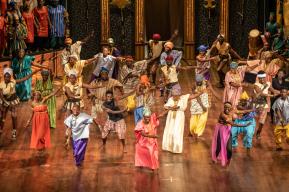
General History of Africa
The General History of Africa (GHA) is a pioneering corpus, unparalleled in its ambition to cover the history of the entire African continent, since the appearance of human beings to contemporary challenges faced by Africans and their Diasporas in the world.
It is a history that no longer leaves the pre-colonial period in the shadows and that deeply integrates the destiny of Africa into that of humanity by highlighting its relations with the other continents and the contribution of African cultures to the general progress of humanity.

About the project
In 1964, UNESCO launched the elaboration of the General History of Africa with a view to remedy the general ignorance on Africa’s history. The challenge consisted of reconstructing Africa’s history, freeing it from racial prejudices ensuing from slave trade and colonization, and promoting an African perspective.
UNESCO therefore called upon the then utmost African and non African experts. These experts’ work represented 35 years of cooperation between more than 230 historians and other specialists, and was overseen by an International Scientific Committee which comprised two-thirds of Africans.

The collection
The complete collection is published in eight volumes. All volumes are richly illustrated with maps, charts, figures and diagrams and a selection of black and white photographs. The texts, for the most part, are fully annotated and there is an extensive bibliography and index.
In recent years, UNESCO has embarked on the preparation and drafting of three new volumes of the GHA (Volumes IX, X and XI).
Three new volumes: IX - X - XI
In order to update and complete the collection, UNESCO has embarked on the preparation and drafting of three new volumes of the GHA. This work aims: to update the collection in the light of the latest social, political and archaeological developments, among others, on the continent (Volume IX); to map and analyse the various African diasporas and their contributions to modern societies and to Africa’s emancipation and development (Volume X); and to contribute to the analysis of new challenges Africa and its diasporas are currently facing, and new opportunities that are open to them (Volume XI).
The preparation and drafting of these three new volumes constitutes a pivotal scientific production by UNESCO for a better understanding of African history and historiography. In this respect, it represents a major contribution on the part of the Organization to the International Decade for People of African Descent (2015-2024), proclaimed by the United Nations General Assembly. It also responds to the initiatives taken by a number of Latin American and Caribbean governments to enhance and promote their African heritage.

More on volumes IX - X - XI
Volume XI
This volume addresses contemporary challenges for Africa and its diasporas around the world. It thus presents a critical perspective, from the point of view of global Africa, which is presented as a player undergoing significant changes. The roles of women and young people, creativity, knowledge production and political changes are all themes central to the future of Africa and its diasporas and are at the very heart of the analysis of this volume.
The first section uses the epistemological forum as a space to explore the concept of global Africa.
The second section focuses on the current situation of globalized Africans, both on the continent and beyond its physical borders.
The third section focuses on Africa in motion and how it is participating in the challenges of the contemporary world.
Volume X
This volume provides critical observation of the dynamics of the relationship between Africa and its diasporas, the movements between Africa and the rest of the world, and the ways in which Africa connects with the rest of the world. It places the innovative concept of global Africa at the centre of its perspective. Beyond the simple Atlantic framework, contributions are based on new epistemologies and historiographical practices, such as the study of biographies in order to understand, from the inside, the history of the diasporas.
The first section discusses the historical contexts in which the concept of race emerged in order to understand how Africans and Afro-descendants perceive and refer to themselves and others.
The second section, a mapping of the African diaspora, examines three aspects based on the geography of the diaspora. Slavery in Africa, no matter where, has been marked by the struggle for freedom. This section also describes cultural identities and how they have been recreated in African diasporas and technological knowledge systems.
The last section of the book addresses the walks of life and biographies of Africans. These biographies of men and women are certainly the most humanized and representative vision of the diaspora.
Volume IX
The purpose of this volume is to update the knowledge of previous volumes of the General History of Africa in the light of new developments in research. Questioning the practices and theoretical postures of the writing of African history, this publication aims to give a fresh look at the long history of Africa, by introducing new categories such as early history.
The first section explores the epistemological, methodological and theoretical foundations of writing on the history of Africa and people of African descent in the twenty-first century.
The second section reviews the content of the first eight published volumes of the General History of Africa.
The third section concerns the updating of the early history – formerly known as prehistory – of the continent.
Finally, the fourth section explores new developments in historical studies (continent-wide social, economic and political developments) over the past 2,000 years.
Global Africa: an innovative concept
Until now, Africa and its diasporas have often been presented as distinct groups, separated by oceans, that have had only sporadic contact during brief historical moments. The writers of the new volumes of the General History of Africa wish to break with this binary and simplistic perspective of relations between Africa and its diasporas.
By introducing the concept of global Africa, the International Scientific Committee wishes to propose an innovative reinterpretation of these connections. This concept makes it possible to understand the history of relations between Africans and people of African descent as an interconnected and continuous process, comprising the circulation of people, knowledge, know-how, and cultural productions and whose matrix is the African heritage.
The concept also makes it possible to go beyond the issue of race and focus on Africa's multifaceted presence in different regions of the world and the diversity of its influences on other cultures. Thus, geographically, the African presence is no longer seen simply from the perspective of the Atlantic world (Europe, the Americas and the Caribbean) but in a truly globalized way, taking into account the diasporas of the Indian Ocean, the Near and Middle East and Asia.
Historically, this presence has been considered over time since ancient times, to illustrate the different waves of “outflows” from Africa (African explorations and expansions outside the continent, mass deportations of Africans to different regions of the world by trafficking, displacements caused by colonization, postcolonial migrations, etc.). In addition to its usefulness in reflecting the diversity of trajectories and the continuity of relationships, the concept of global Africa also provides a better understanding of the aspirations of new generations in Africa and its diasporas to contribute to the African Renaissance and the construction of a twenty-first century pan-Africanism.
This volume provides critical observation of the dynamics of the relationship between Africa and its diasporas, the movements between Africa and the rest of the world, and the ways in which Africa connects with the rest of the world. It places the innovative concept of global Africa at the centre of its perspective.

The eighth volume examines the period from 1935 to the present day. As liberation from colonial rule progresses, the political, economic and cultural dimensions of the continent are analyzed.
Acknowledging the original irony that it was the imposition of European imperialism that awakened African consciousness, the volume points up the vital and growing interrelation of Africa and the rest of the globe.

Volume VII examines the period of partition, conquest and occupation from the beginning of the ‘European Scramble for Africa’ to the Italian fascist invasion of Ethiopia in 1935. Throughout the volume, the focus is directed towards the responses of Africans themselves to the challenge of colonialism.


Volume VI covers the history of Africa from the beginning of the nineteenth century to the onset of the European ’scramble” for colonial territory in the 1880s.
In spite of growing European commercial, religious and political presence during the century, outside influences were felt indirectly most African societies, and they made a variety of culturally distinctive attempts to modernize, expand and develop.


Volume V covers the history of Africa from the beginning of the sixteenth century to the close of the eighteenth century. Two major themes emerge: first, the continuing internal evolution of the states and cultures of Africa during this period; second, the increasing involvement of Africa in external trade- with major but then unforeseen consequences for the whole world.


Volume IV covers the history of Africa from the twelfth to the sixteenth century. This period constitutes a crucial phase in the continent’s history in which Africa developed its own culture and written records became more common. There were several major characteristic themes: the triumph of Islam; the extension of trading relations, cultural exchanges and human contacts; the development of kingdoms and empires.


Volume III covers the history of Africa from the seventh to the eleventh century. Two movements to have major and lasting cultural, political and economic significance on the Continent’s history are covered by this period: the increasing influence of Islam and its dissemination and interaction with traditional African culture in northern and western regions, and the Bantu expansion in the south.


Volume II deals with that long period of Africa’s history that covers some nine thousands years, extending from the end of the Neolithic era, that is, from around the eighth millennium before our era, to the beginning of the seventh century of our era. The different chapters deal with the civilizations of the major geographical zones, following the pattern of African historical research, namely: the corridor of the Nile, Egypt and Nubia; the Ethiopian highlands; the part of Africa later called the Maghrib and its Saharan hinterland; and, the rest of Africa as well as some of the islands in the Indian Ocean. By far the largest proportion of Volume II is devoted to the ancient civilization of Egypt because of its pre-eminent place in the early history of Africa.


Volume I deals with the African prehistory and its methodology. The early part of the volume assesses the importance attached by African societies to their past and the growth and development in African historiography, together with a general outline of sources and techniques. The second half of the volume deals specifically with the earliest man and the prehistory of Africa according to geographical areas: North, South, East, West and Central with the Nile Valley singled out in particular. Chapters are devoted to prehistoric art, agricultural techniques and the development of metallurgy.








